Peter MALONE
Saturday, 18 September 2021 19:24
Goodbye, Mr Chips/ 1969

GOODBYE, MR CHIPS
UK, 1969, 147 minutes, Colour.
Peter O'Toole, Petula Clark, Michael Redgrave, George Baker, Michael Bryant, Jack Hedley, Sian Phillips.
Directed by Herbert Ross.
Peter O'Toole is one of the more vigorous dramatic actors. His restrained, deliberate portrayal of the dedicated and somewhat humourless Mr. Chips is outstanding. He does not shout, but speaks hesitantly and precisely as he changes from a stiff young man to a kind retired teacher. Petula Clark is good too as his actress wife who mellows him. Indeed the focus of the film is on the couple whereas it might have been more effective had we seen more of Chips in his dealings with the boys. The music and songs are negligible, almost better ignored. Production values are symbolised by Pompeii scenes - pastel haze and vast monuments - too big for this modest story. Michael Redgrave, Michael Bryant and Sian Phillips (Mrs. O'Toole), as the theatrical Ursula, strongly support the stars in a film where the value is in the performances.
1. The reputation of this story, the novel, the film classic of the 30s? Appropriate for a musical version? The successful blending of the original with the music?
2. How satisfying for contemporary audiences, the impact of the cast, the musical direction, the songs, Panavision and colour?
3. How appropriate was the blending of the isolated and lonely Mr. Chips with the world of colour Panavision? Did the blending of the story with music work or not? As a musical, the function of the songs, the function of the music, the relationship with character and situation? The quality of the songs?
4. What is the appeal of the basic story for audience identification and interest? Popularity? The sentiment, the elements of cliche, the freshness? The atmosphere and expectations of school in the early twentieth century, school manners and behaviour, restrictions? The school man and his loneliness, the surprise of his falling in love and the freshness of his wife? The theme of transformation, relationship and lack of relationship with boys and masters? The change, ambition, disappointment? The experience of Socco? The achievement and looking back over many years? Audience identification with persons, themes of human endeavour, experience, optimism?
5. The importance of the atmosphere of the 20s and 30s, how did the film communicate the period, the attention to detail in costume and atmosphere? The transition to the war and the atmosphere of World War II, the school, planes and warfare and bombs? The transition to the modern period? The effect for audience identification with the older generation, younger?
6. Brookfield School as an environment for the characters and the situations? The look of the school, the buildings, English tradition, classrooms and the conduct of classes, the masters and their communication with each other, the various houses, the headmaster and his wife, sports events, concerts etc.? The school days song and the collage of boys returning to school and glimpses of their personalities and different types? The school song as it recurred during the film? Insight into the British public school tradition? The atmosphere of education and growth, development and maturity? The ethos of school? The transition to war? The generations? The appeal to all because of school and experience of school?
7. Peter O'Toole's skill at portraying Mr. Chips at various stages of life and development? Critics were unanimous in praising him? Why? How did he understand and communicate the complex character of Mr. Chips? The strengths and weaknesses of his character? The failure of his initial teaching, his dryness and stuffiness, inability to communicate? His strict administration of justice against the wishes of boys and headmaster and masters? His disregard of sport as important? His integrity and sense of values? The highlighting
of his loneliness and the boys' disliking of him? His lack of communication in the common room? Peter O'Toole's skill at illustrating the shyness, the reserve, the theatre and the encounter with Katherine? How did he show the change and the effect of the change and yet it not being a different person? The importance of the songs in the communication of the character of Mr. Chips? See him at school, at the theatre his awkwardness at the meal? The film's preparation for the encounter with Katherine by presenting her at length on the stage. the contrast of different worlds parties. songs, the meal, her warmth compared with his coldness and aloofness?
8. The importance of Pompeii as a place and a setting for uniting them? The old and the new? Study and holiday? The importance of the song and the visualizing of this. aerial shots and movement? The sun and the brightness and the atmosphere of romance? The communication between the two? Their sharing even sandwiches? The credibility of their marriage? How did each meet the need of the other?
9. The world of the headmaster and his attitude towards Chips? Max Staefel and his continued support of Chips? The world of the staff common-room? Staefel as telling Chips the truth? The contrast of Katherine's world especially with the parties the atmosphere of Ursula and her tizziness and theatre world, scandals, superficial people and Chips not being at home? How was this highlighted when Chips went to the party and was awkward at it and yet Katherine was throwing it for him? The invasion by Ursula and her friends of the schools and the comedy ensuing? The contrast with Chips in the sequences when he went to find Katherine and was united with her, the domestic scenes within Ursula's mad atmosphere? How well did the film show the tension between the two worlds and the possibility of communication?
10. The people's amazement at the school? The school song and Katherine's participation? Her changing the atmosphere of the school, the feminine touch? Chips being content, growing older and more satisfied, with friends? Symbolized with the concert? The background to hopes for headmastership, disappointment, final achievement?
11. Katherine's running away and being hurt by Lord? His hostility? The meetings and the attacks on Chips? The blackmail of the money? Ursula's ploy in getting Lord S? The humour of this?
12. The build-up to Katherine's death? Her place at the school, her love for Chips, the irony of the headmastership her generosity and the concert, subjective identification of the audience with the falling bomb, her song? The pathos of her death? The way in which the news of her death was communicated, the boys with the letters the tension between the atmosphere of jokes, Chips' sadness and yet going about his duties the boys' discovery? How did this play on the audience's emotions?
13. The atmosphere of retirement, Chips and his life being transformed by Katherine and the school? The benefit of marriage, communication breaking out of loneliness?
14. What did the songs achieve: 'Fill the World with Love', 'Where Did My Childhood Go?', 'London is London’s 'And The Sky Smiled', 'Apollo'.. 'When I Am Older'. 'Walk Through the World’s 'what shall I Do With Today?', 'What a Lot Of Flowers', 'School Days'. 'You and I 'When I Was Younger'? The places in which they occurred, the photographic treatment.. choreography, visual symbols especially flowers and scenery?
15. How satisfying an entertainment, human document?
Published in Movie Reviews
Published in
Movie Reviews
Tagged under
Saturday, 18 September 2021 19:24
Goodbye, Mr Chips/ 1939
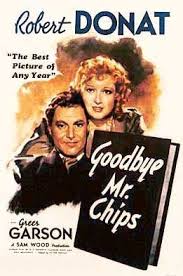
GOODBYE, MR CHIPS
US, 1939, 114 minutes, Black and white.
Robert Donat, Greer Garson, Terry Kilburn, John Mills, Paul Henreid.
Directed by Sam Wood.
Goodbye, Mr. Chips has become a classic M.G.M. film of the 30s. James Hilton was a popular novelist at the time, eg. 'Lost Horizon'. M.G.M. wanted to do their best by his story of the crusty old teacher who marries, softens, rises to authority in the school and is beloved by all. Robert Donat, a master actor of the 30s in such films as The Count of Monte Cristo and The Citadel won an Oscar for his performance - in the year of Gone With the Wind. Greer Garson in her first Hollywood role made a very strong impression as Chips' wife and went on to a very successful career. The film captures the atmosphere of England, the pathos of war, the crustiness of a bachelor and the wonderful mellowing through his experience of marriage. The scenes of Donat and Garson are superb. The sequences of Mrs. Chip's death are also most moving. All in all, Goodbye Mr. Chips is excellent film-making and human drama. There was a musical adaptation made in colour and wide-screen by choreographer-director Herbert Ross, 1969. Peter O'Toole is excellent in this type of role and Petula Clark is very attractive as his wife.
1. Why is the film considered a classic? Its total impact? Its story, feeling, history, characterizations? The acting and the personalities of the stars? Comment on its use of 30s cinema techniques.
2. How important was the theme of emotions, feelings and the transformation of a man's feelings by a woman? So that he can have some achievement in life? Was this the main them? What were the major themes?
3. How accurate was the portrait offered of a man? Mr. Chips as a human being, limited yet moving to a greatness? What were the qualities that Chips had? The amount of time he took to gain them? His initial mistakes, the lost time, the transformation by Catherine, the learning of love, the learning of responsibility?
4. What was the achievement of Mr. Chips? His death bed words and the thousands of boys that he trained? The achievement of the man himself as an example and an inspiration for all the boys, the masters, headmasters? What attitude towards this achievement did the film take?
5. Comment on the use of the flash back structure: the initial ageing of Mr. Chips, the memories, a genial Mr. Chips, the fifty-eight years of service, the chat with the boy at the locked door, How did this create an atmosphere?
6. The presentation of the school and the atmosphere of education: the school song and spirit., the buildings, the tradition, the atmosphere, the staff, the school talk amongst the masters etc.? The presentation of English education from 1870 to 1930? The boys the same at all times - their rowdiness, so wearing on the masters, their baiting of the masters, the school spirit amongst them, sport, response to kindliness? Was this an interesting picture of English education? What values lay behind English education according to the film?
7. Response to the young Mr. Chips (as contrast to the older Ran) his tentativeness, on the station and being baited in the train. his initial class supervision and being baited? His strictness and the effect that this had on him for twenty years?
8. How convincingly did the film show the passing of time - the boys announcing their names, the chatter about history and historical reference, the change in Chip's appearance?
9. The kindliness of Max and the change that it wrought in Chips?
10. The impact of Austria - the mountains and Chip's reservation about people, and yet his response to Catherine's call? Their meeting in the mist, the sandwiches, the coat, the small talk? His shyness at the party? The impact that Catherine made? What was so attractive about her character - modern, common-sensed, kind? (The joke of the mistaken bicycles and ladies). The impressions of Vienna - the Blue Danube, the dancing, the proposal of marriage?
11. How convincing did the film show a marriage as transforming a man? The difference in Chip's appearance and style? Catherine's kindness around the place, the response of the masters, the boys? Her ambitions for Chips and her goading him on to appropriate ambitions?
12. The film's reticence about her death? The sentiment and the impact of this?
13. Catherine's death forgotten as Chips lived on for many decades? His moving to retirement? The Headmaster's hasty decision to retire him? The change in his life and his attitudes? His holding on to traditions and wanting to face so many of the changes of ideas? e.g. Latin pronunciation?
14. The impact of the first world war and the boys going to war? His response to Peter Colley and Colley's wife?
15. The achievement of being headmaster, even in war time? The impact on Chips, his conduct in the school, his kindness and his discipline? Colley's death?
16. How moving was the whole film? Why? The importance of the scene of Chip's dying and his comments And the film ending with the school itself?
17. Robert Donat's performance is considered a masterpiece of acting. Why?
Published in Movie Reviews
Published in
Movie Reviews
Tagged under
Saturday, 18 September 2021 19:24
Goodbye Girl, The
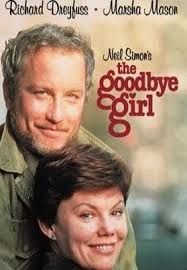
THE GOODBYE GIRL
US, 1977, 110 minutes, Colour.
Richard Dreyfuss, Marsha Mason, Quinn Cummings, Nicol Williamson.
Directed by Herbert Ross.
The Goodbye Girl shows us Neil Simon at his most pleasing and optimistic. Yet again, an Odd Couple (plus an alarmingly precocious ten-year-old, Quinn Cummings, who received an Oscar nomination as did the adult leads with Richard Dreyfuss winning, who illustrate the bitter-sweetness of lack of self-confidence but a capacity to love. The energetic Richard Dreyfuss is a very engaging hero (full of excellent quips and humorous mannerisms). Marsha Mason is a charming heroine, diffident, sentimental. The range of observation of human strengths and foibles is narrowed to New York apartments and parodied off-Broadway theatre, but by wit and sympathy has a great deal to say about human nature itself.
1. Cinema success, with its appeal? Its popularity on its release. awards? A comedy of the 70's and reflecting the 70's?
2. Neil Simon's comedy style? His verbal wit and repartee, examples? His presentation of New York and his capturing the atmosphere of the city? His reputation for presenting interesting and humorous object couples?
3. The quality of the performance of the stars and their meshing together? The kind of response elicited by the stars?
4. The meaning of the title, its wistfulness. theme? The focus on Paula and her experiences before the film and throughout the film?
5. The atmosphere of humour during the credits? Of joy? The relationship between Lucy and Paula, shopping together, California and their hopes? The transition to the finding of the letter. the reading of the letter the grief and upset, the repercussion - humorously Lucy having to do her homework etc.
6. The presentation of Paula's marital status? Her romantic situation? Donna Douglas and her reminder of Bob and Paula's having forgotten her marriage? Her relationship with Tony and its quality? Her anger at his treatment and tearing his photographs etc.? Her reaction to his subletting the flat? Why could Paula not achieve a permanent situation? The atmosphere of marriage, affairs?
7. The introduction to Elliot Garfield? The humour of his arrival, audience antipathy towards him because of the subletting, his arrival in the rain, first encounter with Paula. the locked door, the phone calls? The five minutes and the establishing of the feud between them? His strength of character, hopes? Idiosyncrasies and laying the law down to Paula after her doing this to him? The guitar-playing. chanting - how humorous were these sequences? The establishing of a love-hate relationship between the two?
8. Elliot and the background of Broadway plays? Simon's humour and critique? Richard III and the homosexual interpretation and Elliot's attempt to do this? His exasperation and the comic style of Mark the director? His relationship with the actress and rehearsing in the flat - and Paula's suspicious reaction? The rehearsal sequences, the opening and the humour and failure? The people leaving etc.? His reaction to the failure, drunkenness. the reading of the press clippings etc.?
9. The character of Paula, her strengths and weaknesses, attractive and hard? Getting a job, dance training and her lack of condition the audition? The grocery sequence and her being mugged, and her grief? Her exasperation with Elliot and her apologies? How was she transformed - wearing a dress, smiling etc.? Lucy doing the same?
10. The importance of the night of the play opening and their presence? Lucy sleeping and trying to praise him? Paula's sensitive reaction? Helping him? The humour of their various jobs, eg. her looking after the cars and the Japanese dissatisfaction and Elliot fixing the job for her? The humour of Elliot's job in the nightclub and his fight and standing ovation? The culmination of the meal on the roof, the decision about their relationship? Did it have a basis of love? The aftermath and Paula's reaction and fear, Elliot's thinking it important?
11. The various mistakes that each of them made? The clash in the street and the revelation of their strengths and weaknesses?
12. How important was the character of Lucy? The precocious humour of her remarks? Swearing etc.? The smart New York little girl? Her feelings? Her infatuation with Elliot and his having charisma? Her reaction to the marital situations, her anger when the affair began?
13. The dramatic importance of the clash in the street between Elliot and Paula and the truth told? The importance of riding with Lucy in the carriage and the reconciliation?
14. The blossoming affair? Elliot's acting and its resulting in the film contract? The humour of the setting up of the apartment, painting, refurnishing etc.?
15. The crisis situation renewed and the reaction of each of them? Elliot's decision to go, Paula's reaction? The joy that he left the guitar behind?
16. The satisfaction of the happy ending? What had each character learnt? In relationships?
17. Comment on the film's observation of the New York way of life.
18. How much insight into people and real situations? People's capacity for changing and learning, relating? The basic optimism of the film?
Published in Movie Reviews
Published in
Movie Reviews
Tagged under
Saturday, 18 September 2021 19:24
Gone to Earth/ The Wild Heart
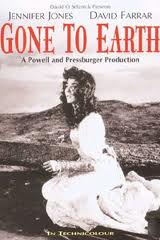
GONE TO EARTH (THE WILD HEART)
UK, 1948, 110 minutes, Colour.
Jennifer Jones, David Farrar, Cyril Cusack, Esmond Knight, Sybil Thorndike, Edward Chapman, George Cole, Hugh Griffith, Beatrice Varley.
Directed by Michael Powell and Emeric Pressburger.
Gone To Earth is a colourful 19th century melodrama. It was written and produced and directed by Michael Powell and Emeric Pressburger. They adapted the screenplay from a novel by Mary Webb. The settings, issues and treatment are reminiscent of the work of Thomas Hardy. Powell and Pressburger had collaborated on many films during the '40s, many of them classics including The 49th. Parallel, The Life and Death of Colonel Blimp, A Matter of Life and Death, Black Narcissus).
The film was co-produced by Alexander Korda's London Films and David O. Selznick for his wife Jennifer Jones. She is supported by a strong English cast including Cyril Cusack, Hugh Griffith and Sybil Thorndike.
The film is set in the English counties at the end of the 19th. century, the transition to the modern era. Jennifer Jones portrays a gypsy living as a daughter of nature, superstitious rather than Christian. She is seduced by the local squire, is married by the local parson. One wants her body, the other her soul. She is torn-between the two. This is all symbolised by the fox-hunt and Hazel's devotion to a fox - to protect from the baying hounds and falls to her death.
The colour photography and locations is quite striking - surrealistic often rather than a realistic re-creation of the times. The film was not a success on first release and was shortened and re-released as The Wild Heart.
1. An interesting and entertaining film? A 19th. century melodrama?
2. The colour photography and the experiments with colour, the location photography, English counties in the 1890s? Manners, parsonages, the streets and the markets, the wild fields and the moors, the hunts? The presentation of nature - the mountains, rock outcrops, the sky? Thunder and lightning and clouds? An environment for Hazel's story?
3. The title and the call of the fox disappearing from the hounds? The opening with the hunt? Hazel and the fox? The fox as symbol? The well and the danger? Hazel protecting her fox and their both being pursued by the hounds, her falling down the well to her death? The final cry of 'Cone to earth'?
4. The atmosphere of the late 19th. century? Growing technology, changes in manners and style? The primitive families of the moors? The gypsies? The link with nature? Being controlled by nature, superstition and religion? The contrast between English civilisation and primitive Britain? How well explored were these themes?
5. Jennifer Jones as Hazel Woodus: as a gypsy girl, in harmony with nature, her father and his fiddling, his looking after the dead? The foxes? Her life out in the country? The visits to the city and her friendship with her cousin Albert, her aunt Prowde? Her attracting the eye of the squire, his pursuing her, taking her home, making her promises, the dresses? Her going back home? Her being protected by Andrew Vessons? Her father's reaction? The possibility of marriage? Her oath that she would marry the first person who asked her? The encounter with the parson, his proposals, her marrying? The encounter with Jack Reddin and his pressure on her, especially at the carnival? The marriage, the celebrations, Jack Reddin's pressure? The parson's reserve with her on the marriage night? Her going off with Jack Reddin, being installed in his manor? The criticism of Andrew? The parson's visit to her, her return home? The hostility of the people wanting her out? The parson’s mother and her disapproval and leaving the house? Hazel's grief, bewilderment? Choices and freedom? The fox escaping, her chasing it, being caught up with the hounds and her death? A melodramatic tragedy?
6. Edward Marston as the gentle parson, his arrival in the village, his hopes? His mother looking after the household? His attraction towards Hazel. his paying court to her, her response? The decision to marry? His realisation of her promise? His reaction on the wedding night, letting her be? Letting her go to Jack Reddin? Visiting the manor to get her back? His winning her back again? The hostility of his mother and his firm stance? His grief at her death?
7. The contrast with Jack Reddin - the squire, the hounds, the manor, Andrew Vessons serving him? His wanting to install Hazel and giving her the dresses? Her escape? The symbolism used of the dark rider - a satanic figure and his looming in her dreams and imagination? Imagination and reality? His pursuing Hazel at the fair, his pressure on her and her feeling that she must go with him, her leaving Edward, her being installed in the house, her growing to dislike and hate Jack? Her decision to leave? His riding to hounds and present at her death?
8. Mrs. Marston, her tolerance on Hazel, the preparations for the marriage, Hazel's leaving and return - and her refusal to live under the same roof? The townspeople sharing her view? Intolerance?
9. Andrew Vessons and his serving the squire, dislike of him, helping Hazel, resigning?
10. The characters in the village from Albert and his liking for Hazel, Aunt Prowde. and her warnings? Mr. James and his leading the group disapproving Hazel?
11. The lifestyle in the town: religious, business, recreation? The celebrations - and Hazel's father and his fiddling at the celebrations?
12. An interesting melodrama? A portrait of a child of nature? The symbolism of Hazel and the fox? Good and evil? Body and soul? The film as a colourful, melodramatic fable?
Published in Movie Reviews
Published in
Movie Reviews
Tagged under
Saturday, 18 September 2021 19:24
Golem, The
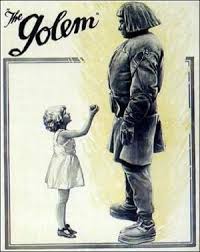
THE GOLEM
Germany, 1920, 85 minutes, Black and white.
Paul Wegener, Albert Steinruck, Lyda Salmonova, Ernst Deutsch, Hanns Sturm.
Directed by Paul Wegener and Carl Boese.
The Golem is one of the classics of the post-World War One German cinema - with its emphasis on horror, after The Cabinet of Dr. Caligari and before Nosferatu. The directors Paul Wegener (who appears as the Golem) and Henry Galeen had made the film in 1914. Their classic presentation is the 1920 version, photographed by Karl Freund (who was to move to Hollywood and photograph and direct several horror films).
The story is a mediaeval legend with Jewish background. A statue is brought to life at a special time of the stars and with the pronunciation of the magic word. The Golem is to protect the Jews - but if it is used for purposes beyond this it wreaks vengeance and goes berserk. The film presents in a number of tableaux this basic plot. The set design and costumes are much more lavish and better designed than those of the expressionist Caligari. There are also some excellent effects with decor and costumes, even with techniques of fixed camera. The film is a variation on the zombie and living dead theme and is an interesting example of German horror. It seems to anticipate, as did many of the German films of the time, the Nazi horror that was about to emerge from Germany. There was a French remake by Julien Duvivier in 1936.
1. The impact of the film? As silent film? From German cinema after World War One? The importance of cinematic techniques: fixed camera, editing, titles? Acting styles? Themes?
2. The quality of the black and white photography, the editing? The imagination and variety of the sets? Special techniques e.g. the summoning up of the spirit Astaroth and his giving the magic word?
3. The background of mediaeval chronicles? The Jewish focus? The pro-Jewish legend? The possibilities for anti-Semitic use? The presentation of this theme in 1920 - and the implications of the '20s and '30s for the Jews?
4. The focus on the rabbi. his being a religious leader, focus on astrology? The situation and the need for defence of the Jews? His plans for making the Golem? His constructing the statue? The incantation - and the eerie face of Astaroth and his giving the word? The Golem coming alive, being tested, exercising its power, the need for secrecy - for the assistant?
5. The parallels with other horror stories e.g. the zombies, the living dead, the Frankenstein monster? The creature as the living dead? Physical appearance. a giant - for good or evil? No moral standards? At the whim of the master? Violence? Servant? The rabbi losing control and the Golem on the rampage? The Golem's manner of walking. defending the Jews, the presence in the Emperor's Court, going berserk, the fires and destruction? The sequence with the children - playing and the irony of the child destroying the Golem by taking the star? The place of The Golem among the classic horror monsters of the cinema?
6. The background of the Christians, the Emperor's decree - and the sumptuous court sequence - with Emperor, courtiers,, decor and tapestries? The anti-Semitic tone of the decree? The Emperor depending on the rabbi for his horoscope? The presence of the Golem? His relenting?
7. Florian as courtier and his exaggerated acting style for courtly manners? The delivering of the decree? The infatuation with Miriam? Their scenes together? The Jewish and Christian romance? The destruction of Florian by the Golem?
8. The rabbis and their leadership, control, use of magic? The assistant? The domestic sequences for the rabbi, especially with Miriam? His exercising the Golem's power at court? In the marketplace doing the work of servant (and the domestic light touch of these sequences)? The Golem out of control, destruction,, the panic of the people? The irony of the children stopping the Golem's power?
9. Atmosphere of horror, suspense? Reality and unreality? A film establishing further conventions for later use? Its classic status?
Published in Movie Reviews
Published in
Movie Reviews
Tagged under
Saturday, 18 September 2021 19:24
Gold Rush, The
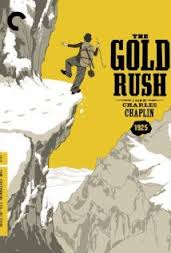
THE GOLD RUSH
US, 1925, 72 Minutes, Black and White.
Charles Chaplin, Mack Swain, Tom Murray, Georgia Hale, Betty Morrissey.
Directed by Charles Chaplin.
The Gold Rush is a Chaplin classic of the mid-20s. Having established himself as a master of short films and comic style in the second decade of our century, Chaplin had established himself also as 'the little man' and 'the tramp'. As the 20s came on, he moved into feature films with sentimental comedies like The Kid and his attempt at serious drama with A Woman of Paris. This was followed by The Gold Rush which has some of the most famous of comedy routines especially the house on the edge of the cliff. Chaplin later put a musical score to the film during the 30s as he did with most of his silent features. The Gold Rush as with the features of the 20s presents Chaplin at his best.
1. How enjoyable a Chaplin comedy? The particular nature of Chaplin's style as a person, comic manner?
2. The film is considered a Chaplin classic. Why? As a silent classic, the addition of sound, Chaplin's own voice-over, music?
3. The importance of the commentary and Chaplin's own attitude towards the little fellow? Moralizing, sympathy, sentiment, sentimentality?
4. The importance of the visuals and their quality: the snow, the sets, the hut, the saloon, the ship?
5. How important were the set pieces of comic business? How successful: the wind blowing in the hut, the little man avoiding the rifle barrel, the house balancing on the cliff, the meal with the eating of the boot, Big Jim imagining the little fellow as a chook?
6. The theme of the gold rushes and American dreams and getting rich quickly? The long line of those going to the mines? Lack of fulfilment, the fulfilment of dreams at the end?
7. The character of the little man and what he represented? As contrasting with Big Jim, Black Larsen as the villain? The little man and the encounter with Georgia, the girl of elusive dreams? The happy ending?
8. Big Jim and his dreams, Black Larsen and his murderous villainy? Good rewarded, evil punished?
9. Georgia as the heroine, the other girls in the saloon, the dancing, the visit and the mockery, forgetting the dinner? The little man imagining the happiness of them at the dinner? Their change of heart? Reconciliation before Big Jim took him off?
10. The humour of rediscovering the mine and gaining wealth? The ship sequences and the fulfilment?
11. Insight into human nature via character, situations? The charm and humour of Chaplin's work?
Published in Movie Reviews
Published in
Movie Reviews
Tagged under
Saturday, 18 September 2021 19:24
Gold of the Seven Saints
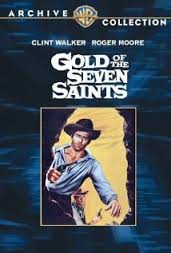
GOLD OF THE SEVEN SAINTS
US, 1961, 89 minutes, Black and white.
Clint Walker, Roger Moore, Leticia Roman, Robert Middleton, Chill Wills, Gene Evans.
Directed by Gordon Douglas.
Gold of the Seven Saints was probably an oddity when it was made and first released. It seems an oddity in retrospect.
The film is a buddies western with echoes of The Treasure of the Sierra Madre. It was originally planned as a Howard Hawks film after Rio Bravo. His regular screenwriter of the time, Leigh Brackett, was a co-author of the screenplay. She had worked on Rio Bravo, was to work on Hawks' next film Hatari and was writing continuously until her death while working on The Empire Strikes Back.
On paper, the film has the camaraderie of the Hawks- Brackett films. However, Gordon Douglas gives the film his regular action style - and the film is enjoyable on that level. Clint Walker was popular from television and is an earnest if stolid hero. Roger Moore in his young days is the talkative and likable Irishman. There is a solid supporting cast led by Chill Wills although it is not a great cast. For some reason, the film, while made in Cinemascope, was photographed in black and white even though it has excellent Utah settings. On the whole, the film portrays buddies and their friendship, their being pursued by greedy westerners after the fold and betrayed by Mexican friends. Chill Wills is an amiable drinking doctor. There is romance and robust action and comedy. However, on the whole, the film seems fairly anti-climactic.
Published in Movie Reviews
Published in
Movie Reviews
Tagged under
Saturday, 18 September 2021 19:24
Golden Seal, The
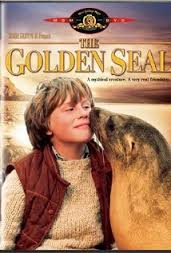
THE GOLDEN SEAL
US, 1983, 94 minutes, Colour.
Stave Railsback, Michael Beck, Penelope Milford.
Directed by Frank Zuniga.
The Golden Seal is vigorous family entertainment. It is basically familiar material, a family in remote circumstances and a son who befriends a seal. Naturally, there are crises. However, the film was made in the Aleutian Islands and has extraordinary scenery of mountains, snow-clad peaks, islands and tempestuous seas. The golden seal is also a symbol of Aleutian Island mythology, that it will appear before an important time in the world and is a bringer of peace.
There are very good action sequences, delightful sequences of the boy with the seal - and it is solid family entertainment.
1. The picture of life in the Aleutian Islands? Remoteness? Grandeur of scenery? Islands, the mountains and the sea? Simple lifestyle? The house? Travel and communication by boat? The small town and the bringing in of supplies?
2. Scenes of family life - the bond between husband and wife, with their son? The way of training him to cope? And the boy's coping during the storm?
3. The mother and her care for her son, keeping the house, the vegetables? Her concern when he disappeared? Her encouraging her son to express his feelings and tears? The strong father? His training his son to manage? The vision of the golden seal? The father wanting to track it, shoot it? The reaction of his son? The final fight? The seal going - and the father encouraging his son to weep when he was sad? The background of the footloose father and his settling down in the islands?
4. The colour photography of the sea, the storms? Communication by boat? The importance of the sea? Coast? Seals?
5. The significance of the seal? The myth? The quest for seeing it? The Aleutian Islanders and the sense of vision? The oil rigger and his wanting to get the pelt? The father and his wanting to get the pelt and secure his family? The hunting and the shooting?
6. The storm sequence, the bridge collapsing, their rescue in the river?
7. The boy and his seeing the seal? His saving it? Its giving birth? The lyrical swimming sequences?
8. The pursuit, the boy disillusioned with his father, the oil rigger and his double talk, the Aleutian Islander and his wanting to shoot? The father having a change of heart? The islander unable to shoot? The old blind man and his sense of vision?
9. The myth and its meaning?
10. Attractive picture of family life? A boy and animals? Conservation? Message of peace and harmony?
Published in Movie Reviews
Published in
Movie Reviews
Tagged under
Saturday, 18 September 2021 19:24
Golden Girl
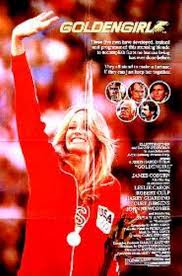
GOLDEN GIRL
US, 1979, 100 minutes, Colour.
Susan Anton, James Coburn, Curt Jurgens, Leslie Caron, Harry Guardino, Robert Culp.
Directed by Joseph Sargent.
Golden Girl concerns Americans at the Moscow Olympics. If a lot of what happens in this film is true, there are reasons for not participating, for Golden Girl is about experimentation with humans, intensive physical training and psychological behaviour modifications. The themes are interesting and their implications frightening. The treatment is popular and, sometimes, corny. Susan Anton (a taller Farrah look-alike, but with intelligence) carries the film well. James Coburn leads an international supporting cast ranging from Leslie Caron to a parody of a German doctor by Curt Jurgens - and even John Newcombe for some minutes. Huge sums invested for the commercial use of athletes, public lies and the success ethic are criticised.
1. The significance and tone of the title? Expectations? The focus on the Olympics and the athlete? A glossy drama thriller? Critics' comments that it looked as programmed as its heroine - a just comment?
2. The contribution of the stars and their styles, the international touch? The world of sport, professionalism, training, the Olympics and the various games? The world of big business and success? The media? The musical score?
3. The use of training for the Moscow Olympics and the ironies of the events of 1980?
4. The introduction to Golden Girl - the credits and her initial training programme, her being tired, relentlessness in her goals? The illustration of programmes in training, the elaborate plant for her to practise (and the later denials of all this)? Golden Girl as a person, her origins, her relationship with her father? Her special aide? The seeing of her in action and the agent promoting her? As illustrated by the rehearsed press conference with her superficial answers, her lack of readiness to answer true questions? A woman being programmed both physically and psychologically for success? The irony of the promotion of her own success and her father's scientific advancement?
5. The effect of the training on her as a person? The impact of the various training sequences? The competitiveness, the various heats, her placement, her collapse when ousted? (And the irony of a buying of a place for further competition?)
6. The build-up to the Moscow Olympics? Psychological training, the physical studies, the various heats, the encounters with the other athletes, coverage by the media, the agent and his connections with the business world? Her motivation, discussions with the agent and her mellowing? The deterioration of her health and the discovery of diabetes, the need for medication? Her clash with her father, her disgust at the truth, her knowledge about her state of health and her reaction, her wanting to win? Her moving to success despite all clashes Her ultimate winning? The price of success with the final conference?
7. James Coburn as the agent - a man of the world, his introduction to Golden Girl, watching her train, buying her opportunities, his links with deals and businessmen, the implications of advertising and the revenue for the amateur sportswoman becoming professional? His falling in love with her? His witness to her health crisis, to her clash with her father, to her reliance on her aide? The encounters in Moscow, trying to tell her the truth when she was with the doctor? The clashes? His final concern about her? His disgust at the final press conference?
8. Dr. Serafin and his Germanic fanaticism, the Nazi overtones? His explanations, his scientific writing, his lies? His using his daughter? His relying on his aide to help and control her? His pride? Television interviews? His emotional outbursts after her rejection of him, chasing her at the Olympics, the insanity of his TV interviews?
9. Leslie Caron as the aide - her continual watching of Golden Girl, care, bonds? Her being caught up in the mystique of Golden Girl's success? Her care for her, her bond with the promoter?
10. The TV interviewer and his investigations, his probing questions, the cover-up by the agent? The interviews with Dr. Serafin?
11. The business group and their interests, personalities, their presence at all the heats, in Moscow, the lies told? Their final success financially?
12. Golden Girl's trainer and his relentless attitudes, blackmailing her, working in collusion with the aide? His reaction to her success in the races?
13. The picture of the Olympic athletes? The German girl and the photo to Golden Girl? The American rivals? The black girl in the shared room? The winning of the medals and the clash - the exhibition of diabetes and the change of personality?
14. The running of the races, the way Golden Girl was photographed, the excitement of the races and audience participation? Golden Girl's wins - use of fast and slow motion? The build-up of the various races during the practice - the range of races run, her lack of tiredness and people marvelling at this? Her success in Moscow? The winning of the medals?
15. The finale with Golden Girl succeeding by herself, defying her father, getting a certain amount of freedom - but succumbing to the pretaped answers at the press conference?
16. A satisfying sports film? The science fiction overtones of brainwashing and human programming?
Published in Movie Reviews
Published in
Movie Reviews
Tagged under
Saturday, 18 September 2021 19:24
Gold
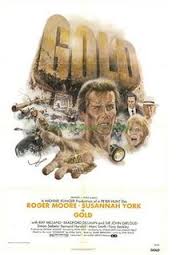
GOLD
UK, 1974, 124 minutes, Panavision.
Roger Moore, Susannah York, John Gielgud, Ray Milland, Bradford Dillman.
Directed by Peter Hunt.
If movies mean entertainment, spectacle, action, excitement, colour, all combining effectively to grip audiences and carry them with it, then Gold qualifies well as a movie. Fast-paced continuous action, colourful South African mining locations (with incidental glances at black-white relationships) give the film added tone. Roger Moore is the stolid mine manager in the company of Bradford Dillman as a crooked tycoon, Susannah York (always a lively heroine) and a comic gruff performance by Ray Milland. It is somewhat hard to remember why the film was so entertaining, it must have caught us in its flow and tension and been satisfying while there on the screen.
1. The tone of the title, the song, the atmosphere of gold, the credits etc.? How enjoyable was the film? Why?
2. The film was made obviously for entertainment purposes. What were the main entertainment ingredients? Fast action, suspense, location, settings and photography, the characters, danger, romance? Why were these ingredients so successfully used?
3. Comment on the use of widescreen and colour, African photography, the size of the film, the mine locations, the disaster aspects of the film. Comment on the opening song, the symphony of gold during the credits, the visualising of mining and the processing of gold?
4. How important was South Africa for the setting? Its beauty, the presentation of the wildlife, the African people, the whites and the big cities, the blacks and their working with the whites their life by themselves etc.? South Africa as a wealthy country, a country built on gold? The mines, the details of the mine work? The relationship between black and white? The medal ceremony and all the overtones of this? The heroism of black and white, black at the end helping white? (Was the film patronizing black Africans or did it treat them well?)
5. How obvious were the racial themes? How did they provide a realistic background? Character of Big King, his role in the mines with the men. relationship with Slater the medal reception, the clash with Kowalski, his final giving of his life for Slater?
6. What moral atmosphere for this film? The initial disasters, deaths, life was fairly cheap? The atmosphere of greed, the making of money, power, the big international deals and the lack of scruples in changing peoples' lives, affecting Stock Markets. letting thousands of people die if necessary? The atmosphere of trust and distrust, the plans and the double dealings and double crossings? what is audience reaction to this? How interested, how repelled? What moral judgement did the film make on this atmosphere?
7. How successful was the film in the action department? The initial disaster, the flooding of mines, the collapse, the dialogue helping the fast pace. the building up of atmosphere, the final crisis with the work, the collapse, flooding, the need for the plane to land, the rescue, death, murder and the killing of Steyner?
8. How interesting a character was Rod Slater? In himself? His background, the dossier on him, his particular talents, relationship with the men and with King? The attitude of Hirschfeld towards him? Steyner choosing and using him? His relationship with Terry? The background of his relationship with women? How well did he love Terry, did he use her? The fact that he was a victim of a plot without realising it? The fact that he could be deceived? The final heroics? Was Slater more than a two-dimensional character in an action movie?
9. How attractive a heroine was Terry? Strong? Relationship to her grandfather and her influence, the sequences of married life with Manfred, the strained relationships, the scenes at the airport. at home, her infatuation with Slater? How did it grow into love? Her influence for Slater getting the job, the significance of her being with Slater during the disaster, also being used by Manfred, the heroics with the plane, the happy ending.
10. How successful a portrait was Ray Milland's performance as Hirschfeld? The credibility of an African tycoon? The hold that gold had on him and his family, his toughness and ruthlessness. his soft spots, his relationship with his grand-daughter, with Manfred, with the men. the medal-giving etc.? His response to the disaster? How interesting a portrayal was this? What insights into the tycoon character?
11. How interesting a villain was Manfred Steyner? What kind of man was he in himself? Why had he turned crooked? His obsession with work and the mine? His relationship with his wife? His ambitions through her? Using of Slater? His double dealing on the international scene? The relationship with Farrell, and the deals? The sinister presence of Marais? The horror of his death? The brutality and the justice?
12. How interesting a villain was Marais? The tones of homosexuality, of power? Of sinister pushing? How evil was he? The murder of Steyner. his death?
13. How evil were the men like Farrell? The nature of the international meetings and the lack of scruple? Greed? The bomb-murder of the German partner?
14. How did this contrast, with the presentation of King, black man in Africa with the whites? Heroism, death?
15. How impressive were the colourful heroics? The fast pace detail of each disaster? The landing of the plane etc.?
16. Which particular incidents were impressive? The action, the presentation of Africa, the examples of the African dancing etc.? The blending of background with incident?
17. What values were behind the makings of this film? Its observation on the 20th century world?
Published in Movie Reviews
Published in
Movie Reviews
Tagged under